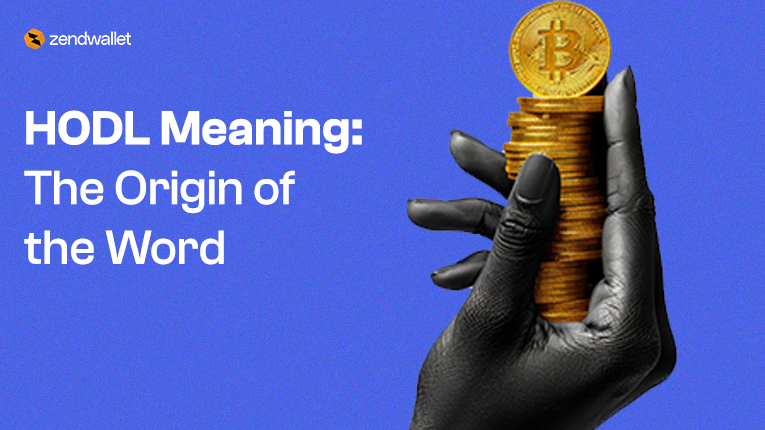If you’re planning to trade in the crypto market, one of the first things you’ll need is a safe and reliable way to store your digital assets.
A cryptocurrency wallet is exactly what you need to manage, store, send, and receive your crypto assets like Bitcoin, Ethereum, and many others.
In this article, we will explain a crypto wallet, how it works, how to set one up, and why ZendWallet is a great option.
What is a Cryptocurrency Wallet?

A cryptocurrency wallet is a secure digital wallet that allows you to store and manage your digital currencies.
Unlike a traditional wallet, which holds physical cash and cards, a crypto wallet holds the private and public keys needed to access and control your digital assets.
When you use a crypto wallet, you’re not storing your cryptocurrency within the wallet itself.
Instead, the wallet securely stores the keys that give you access to your coins or tokens on the blockchain, which is a decentralized network.
Essentially, your crypto wallet acts like a keychain that keeps your cryptocurrency safe and accessible.
Understanding the Two Key Components of a Crypto Wallet
Public Key: This is like your email address. It’s the address you share with others so they can send you cryptocurrency. You can share it freely, and it’s not a security risk.
Private Key: This is the critical part of your wallet. It’s like your password, and you must keep it safe at all costs. With your private key, you can access and control your funds.
If someone gains access to your private key, they can take control of your assets.
How Does a Cryptocurrency Wallet Work?

To make things simple, a crypto wallet is more about the keys than the actual coins. Your private key is what allows you to send and spend your cryptocurrency.
Here’s how it operates:
Sending Funds: When you want to send cryptocurrency to someone else, you use your private key to sign the transaction. This authorizes the transfer, and the transaction is recorded on the blockchain.
Receiving Funds: When someone sends you cryptocurrency, it is transferred to your public key (the address you share). You can check the balance associated with your public key, but you need your private key to move those funds.
Each transaction is verified and added to the blockchain, a distributed ledger, which ensures the security and integrity of every transfer.
In essence, cryptocurrency wallets provide a way to interact with the blockchain in a secure manner.
Types of Cryptocurrency Wallets
There are several types of cryptocurrency wallets, each designed to offer varying levels of security and convenience. Here’s a breakdown of the most common types:
Hot Wallets (Online Wallets)
Hot wallets are wallets that are always connected to the internet. These wallets are convenient because they allow you to access your funds anytime, anywhere, making them ideal for frequent transactions. There are different forms of hot wallets, including:
- Mobile Wallets: These are apps on your smartphone, making it easy to manage your cryptocurrency on the go.
- Web Wallets: These are browser-based wallets that you can access from any computer or device with an internet connection.
- Desktop Wallets: These are software wallets installed on your computer.
A hot wallet gives you quick access to your funds, but is more susceptible to online threats like hacking. Therefore, it’s important to choose one with strong security features.
ZendWallet is a great example of a crypto wallet that is both secure and user-friendly, offering you easy access while keeping your assets safe.
Cold Wallets (Offline Wallets)
Cold wallets are not connected to the internet, which makes them far more secure for long-term storage. These wallets include:
- Hardware Wallets: These are physical devices that store your private keys offline. They are very secure because they are immune to online threats, but they are less convenient for frequent use.
- Paper Wallets: This is a piece of paper on which your private and public keys are printed. Paper wallets are a highly secure offline option but require careful handling to prevent loss or damage.
Cold wallets are ideal for people who don’t need to access their crypto frequently and want to store their assets long-term without worrying about online threats.
You can also read Hot Wallet vs. Cold Wallet – The Key Difference Explained in 2025
How to Set Up a Crypto Wallet

Setting up a cryptocurrency wallet is a simple process. Let’s go step by step:
Step 1: Choose Your Wallet
First, you need to decide which crypto wallet is best for your needs. If you’re looking for something easy to use with solid security features, ZendWallet is a great option.
It supports a wide range of cryptocurrencies, is user-friendly, and has robust security to protect your funds.
Step 2: Sign Up and Create an Account
After selecting your crypto wallet, the next step is to create an account. This process typically involves providing your email address and setting up a password. Make sure your password is strong and unique to avoid any security risks.
Step 3: Back Up Your Wallet
One of the most important parts of setting up a crypto wallet is backing it up. You’ll receive a recovery phrase usually a sequence of 12 to 24 words.
This recovery phrase is your backup key in case you lose access to your wallet. Write it down and store it in a secure location, preferably offline.
Step 4: Enable Two-Factor Authentication (2FA)
Two-factor authentication (2FA) adds an extra layer of security. When you enable 2FA, you’ll need to enter a code sent to your phone or email each time you log in to your wallet.
This makes it harder for hackers to gain access to your funds.
Step 5: Add Funds to Your Wallet
Once your wallet is set up, you can start adding funds. This can be done by transferring cryptocurrency from another wallet or by buying cryptocurrency on an exchange and sending it to your wallet.
ZendWallet supports multiple cryptocurrencies, so you can easily manage your digital assets all in one place.
Why ZendWallet is a Great Option

When choosing a cryptocurrency wallet, security and ease of use are essential. ZendWallet stands out because it offers both.
- Security: ZendWallet uses strong encryption methods to keep your private keys safe. With 2FA and other security features, your funds are protected from unauthorized access.
- Convenience: ZendWallet offers a simple, intuitive interface that makes managing your cryptocurrency easy, whether you’re a beginner or an experienced trader.
- Multi-Currency Support: Whether you want to store Bitcoin, Ethereum, or any of the numerous altcoins, ZendWallet has you covered, making it a versatile option for crypto enthusiasts.
- Support: ZendWallet has a dedicated support team that is available to assist you with any issues or questions.
Best Practices for Using Your Crypto Wallet

To keep your cryptocurrency wallet secure, follow these tips:
- Use Strong Passwords: Your wallet’s password should be unique, complex, and not used for any other accounts.
- Enable 2FA: This adds an extra layer of protection against unauthorized access.
- Back Up Your Recovery Phrase: Write down your recovery phrase and store it in a safe place, separate from your wallet.
- Stay Vigilant: Be cautious of phishing attempts and always double-check the website you’re using when logging in to your wallet.
FAQs About Cryptocurrency Wallets
What is the difference between a hot wallet and a cold wallet?
Hot wallets are connected to the internet and are great for easy access and frequent transactions. However, they are more vulnerable to hacking.
Cold wallets, on the other hand, are offline, providing better security but are less convenient for everyday use.
How can I recover my crypto wallet if I forget my password?
If you forget your wallet password, you can recover it using your backup recovery phrase. This phrase will allow you to regain access to your wallet and reset your password.
Is it safe to store all my cryptocurrency in one wallet?
While it’s convenient, it’s a good idea to spread your assets across different wallets, especially if you hold a significant amount of cryptocurrency. Consider using cold wallets for long-term storage and hot wallets for active transactions.
Can I use ZendWallet for all types of cryptocurrencies?
Yes, ZendWallet supports a wide range of cryptocurrencies, allowing you to store Bitcoin, Ethereum, and various altcoins in one secure place.
Conclusion
A cryptocurrency wallet is a must-have for anyone who wants to manage digital assets.
From storing to sending and receiving crypto, it’s important to pick a wallet that combines simplicity and strong security.
Our platform, ZendWallet, stands out as a great choice, offering a safe and easy experience that grows with you as you explore the crypto market.
Setting up your crypto wallet is straightforward. By following the steps above, you’ll be well on your way to managing your digital assets with ease.
Ready to take charge of your crypto? Start with ZendWallet today and enjoy a smooth and secure experience. Be limitless with ZendWallet. The best crypto wallet in Africa.
You can also read: Blockchain Wallet: What is it & 5 Types of Wallets in Blockchain.



